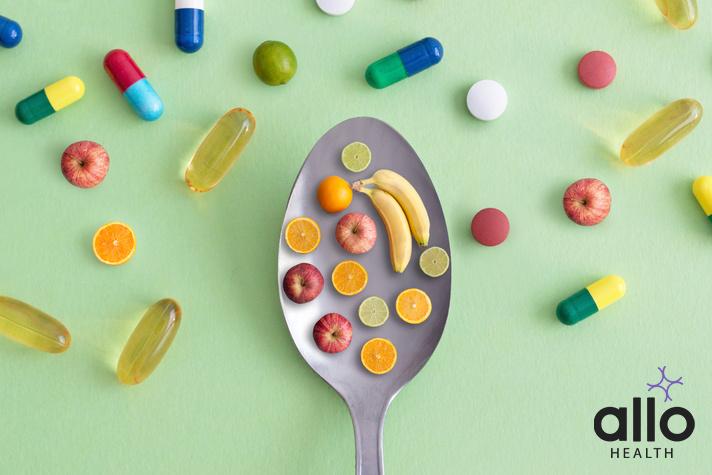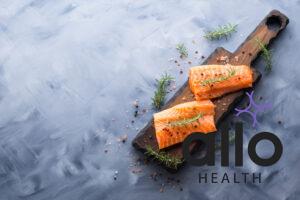The Essential Vitamins and Minerals for a Healthy Sex Life

Allo Health is dedicated to personalized well-being, offering support and trusted information tailored to individual health goals. The platform emphasizes human-generated content, led by a distinguished medical team of experts, including physicians and sexual health specialists. Their commitment to credibility involves rigorous fact-checking, authoritative research, and continuous updates to ensure accurate, up-to-date information. Allo Health's unique approach goes beyond conventional platforms, providing expert-led insights and a continuous commitment to excellence, with user feedback playing a crucial role in shaping the platform's authoritative voice.

Dr Prafulla has done her MBBS from MGMC&RI , Pondicherry .She has a diverse background in medicine. With 9 years of clinical experience, including 4 years dedicated to serving rural communities, Dr.Prafulla has developed a profound understanding of the unique challenges and needs of individuals from all walks of life.Having spent significant time in rural health, Dr.Prafulla has honed their ability to connect with patients on a personal level, fostering trust and rapport to ensure open and honest discussions about sensitive matters, including sexual health. Recognizing the crucial role of the human psyche and relationships in overall well-being, Dr. Prafulla brings a holistic approach to her practice, acknowledging that emotional and psychological factors are vital components of sexual health.
Why This Was Upated?
Our experts continually monitor the health and wellness space, and we update our articles when new information became available.
Updated on 15 April, 2024
- Article was updated as part of our commitment to diversity, equity, and inclusion.

"The following blog article provides general information and insights on various topics. However, it is important to note that the information presented is not intended as professional advice in any specific field or area. The content of this blog is for general educational and informational purposes only.
Book consultation
The content should not be interpreted as endorsement, recommendation, or guarantee of any product, service, or information mentioned. Readers are solely responsible for the decisions and actions they take based on the information provided in this blog. It is essential to exercise individual judgment, critical thinking, and personal responsibility when applying or implementing any information or suggestions discussed in the blog."
There are a lot of things that determine your sex drive. Hormones, age, psychological factors and more. In this article, we look one such factor that affects your libido: diet. Your food choices can play a crucial role in determining the quality of your sexual experiences. Just as it is important to eat a balanced diet for overall health, certain vitamins and minerals can boost libido, improve sexual function, and enhance fertility.
How Does Vitamins and Minerals Affect Your Sexual Health?
Crucial vitamins and essential minerals play a vital role in influencing sexual health and drive. For instance, vitamin A is essential for maintaining healthy reproductive tissues and supporting the production of sex hormones in both men and women. Adequate levels of vitamin A contribute to the proper functioning of the gonads and can enhance sexual desire and arousal.
Moreover, other essential vitamins and minerals, such as vitamin D, zinc, and magnesium, support hormone regulation, improve blood flow, and promote nerve function, all of which are fundamental aspects of a healthy sexual response.
A balanced intake of certain nutrients can help enhance your sexual health by maintaining optimal sexual drive and their overall sexual well-being.
Vitamin B Complex

B complex refers to a group of water-soluble nutrients that include Vitamin B1 (thiamine), B2 (riboflavin), B3 (niacin), B5 (pantothenic acid), B6 (pyridoxine), B7 (biotin), B9 (folate), and B12 (cobalamin). All of which contribute to the physiological processes that influence sexual function. Vitamin B3, B6 and B12 are especially highlighted in this case.
Vitamin B3: Also known as niacin, promotes vasodilation, improving blood flow to the sexual organs, potentially enhancing erectile function in men and arousal in women.
Vitamin B6: Vitamin B6 is essential for hormone regulation and neurotransmitter synthesis, supporting a healthy libido and sexual function in both men and women. Adequate levels of B6 may contribute to improved mood and arousal.
Vitamin B12: It supports the production of sex hormones and contributes to nerve function, enhancing sexual arousal and overall performance. Deficiency may lead to reduced libido and sexual dysfunction.
Where Do I get Vitamin B Complex from?
- Vitamin B3 can be found in poultry (chicken, turkey), fish (tuna, salmon) and peanuts.
- Vitamin B6 can also be found in the above mentioned poultry and fishes along with banana and potatoes
- Vitamin B12 is found in animal products like meat, fish, poultry along with diary products like milk and cheese. For those, who can’t consume diary products, soy milk, and almond milk are great alternatives.
Vitamin C
Apart from its antioxidant properties, vitamin C helps produce collagen. Collagen is a protein that strengthens the tissues and cells of the body. How does that help with sexual function? Collagen’s ability to strengthen tissues and cells of the body also includes the muscles and blood vessels involved in sexual activity.
Vitamin C also enhances circulation, boosts immunity, and reduces stress, all of which can contribute to better sexual health.
Vitamin C has also improves skin health and reduces the risk of chronic diseases such as heart disease and cancer. Good skin, enhanced sex drive and better health? Sign us up.
Where Do I get Vitamin C from?
- Fruits: Citrus fruits like orange, kiwi fruit, and lemons. Other fruits like strawberries, mangoes, watermelons and papayas.
- Vegetables: Green vegetables like broccoli, spinach and brussels sprouts. Other vegetables like tomatoes, sweet potatoes and red/green bell peppers.
Health experts recommend that adults consume at least 75-90mg of vitamin C per day. If you are unable to meet your daily vitamin C needs through diet alone, supplements are also available.
Vitamin D
Vitamin D is a crucial nutrient that helps maintain bone health, regulate immune function, and reduce inflammation. But it also plays a role in male sexual function? How, you ask?
Testosterones are male hormones that affects libido, muscle mass and fertility. Vitamin D increases the production of this male hormone. Researches have suggested vitamin D deficiency or low levels of the vitamin are linked to erectile dysfunction and other sexual dysfunctions/concerns.
Too much of a good thing can be a bad thing; while vitamin D does increase testosterone levels, studies have shown that too much of this vitamin can have the opposite affect. It can lower testosterone levels and thus, lead to other health problems.
Where Do I get Vitamin D from?
- Sunlight: Your skin can produce vitamin D when exposed to direct sunlight. Spending time outdoors, especially during sunny mornings, allows your body to synthesize vitamin D naturally.
- Fatty Fish: Fishes like salmon, mackerel, trout, and sardines.
- Cod Liver Oil: Cod liver oil is a rich source of vitamin D and can be consumed as a dietary supplement.
- Fortified Foods: Some foods, such as milk, orange juice, cereal, and yogurt, are fortified with vitamin D to help boost intake.
- Egg Yolks: Egg yolks contain small amounts of vitamin D, but the level may vary depending on the chicken’s diet.
- Beef Liver: Beef liver provides some vitamin D, although it is relatively less compared to other sources.
If you have concerns about vitamin D deficiency, it’s best to consult with a healthcare professional to determine the appropriate supplementation or dietary adjustments for your specific needs.
Vitamin E
Vitamin E, also known as the sex vitamin, plays a vital role in supporting sexual health. So, what does it do?
Vitamin is a powerful antioxidant, and helps protect cells from oxidative stress. Oxidative stress can damage tissues and impair blood flow. Presence of vitamin E in the body promotes healthy blood circulation and thus, oxygen and along with it, nutrients get delivered to the sexual organs.
This essential vitamin also aids in production of sex hormones, contributing to a healthy balance of testosterone and estrogen levels in both men and women.
Some studies suggest a possible link between vitamin E and erectile dysfunction; vitamin E is said to increase sexual desire by improving vascular health.
Where Do I get Vitamin E from?
- Nuts and seeds: almonds, sunflower seeds and hazelnuts.
- vegetable oils: sunflower oil and safflower oil.
- Leafy vegetables: spinach and broccoli.
- Fortified cereals.
Zinc
While Zinc is an essential mineral that supports multiple bodily functions, including immunity, wound healing, and DNA synthesis, it is also a crucial nutrient contributing to male sexual health.
Zinc is necessary for the production of testosterone and semen, which are both important for sexual desire and fertility.
Adequate zinc intake can improve libido, boost sperm quality, and reduce the risk of prostate problems. Zinc-rich foods include oysters, beef, liver, beans, and nuts.
It’s interesting to note that zinc deficiency is common, especially in developing countries like India. Inadequate zinc intake can lead to a range of health problems, including impaired immune function, delayed wound healing, and decreased fertility.
Where Do I get Zinc From?
- Oysters are one of the richest sources of zinc.
- Beef, pork, chicken, turkey and lamb.
- Other seafood like crabs and shrimps.
- Pumpkin seeds.
- Lentils and whole grains like quinoa.
- Beans (kidney beans, black beans).
- Nuts like cashews, and almonds.
Vegetarians and vegans may also be at risk of zinc deficiency, as plant-based foods are not as rich in zinc as animal-based foods.
Supplementation with zinc may be necessary for individuals who are not able to meet their daily zinc requirements through diet alone.
Excessive zinc intake can also have negative health effects, such as nausea, vomiting, and diarrhea. Therefore, it is recommended to consult with a healthcare professional before starting any zinc supplementation.
Selenium
Selenium is a trace mineral (minerals required by the body in very small amounts for various physiological functions) that plays a crucial role in reproductive health, particularly in men.
Selenium is necessary for the production of healthy sperm and can improve male fertility.
It is also an antioxidant that can protect the body against oxidative stress, which can harm the cells and tissues involved in sexual function.
Studies have shown that selenium may have a positive impact on overall sexual function and libido in men. Additionally, selenium has been linked to a reduced risk of prostate cancer. However, too much selenium can be harmful and lead to toxicity.
Where Do I get Selenium From?
- Brazil nuts (one of the richest sources of selenium)
- Seafood (tuna, shrimp, sardines)
- Chicken (particularly the meat from the leg), Turkey
- Eggs
- Sunflower seeds
- Brown rice
- Whole wheat bread
- Mushrooms (especially shiitake mushrooms)
- Spinach
The recommended daily intake of selenium for adults is 55 micrograms per day. It is always best to obtain nutrients from whole food sources rather than supplements, unless advised otherwise by a healthcare professional.
Iron
Iron is an essential mineral that helps transport oxygen throughout the body, which like discussed before, is important for maintaining healthy tissues and organs, including those involved in sexual function.
Iron deficiency can lead to anemia, a condition that causes fatigue, weakness, and reduced libido. Women are particularly at risk of iron deficiency due to menstrual bleeding.
Iron deficiency can also affect men’s sexual health. Studies have shown that low iron levels can lead to erectile dysfunction and decreased sperm count.
Men who follow a vegetarian or vegan diet may be at a higher risk of iron deficiency, as plant-based sources of iron are not as easily absorbed by the body as animal-based sources. It is recommended that men consume iron-rich foods such as lean red meat, seafood, and fortified cereals to maintain optimal sexual health.

Where Do I get Iron From?
- Red meat (beef, lamb, pork) and poultry (chicken, turkey)
- Organ meats (liver, kidneys)
- Fish (especially tuna, salmon) and shellfish (oysters, clams)
- Legumes (lentils, chickpeas, beans)
- Tofu
- Spinach and other leafy greens
- Fortified cereals
- Quinoa
- Pumpkin seeds
- Nuts (cashews, almonds) and dried fruits (raisins, apricots)
Consuming vitamin C-rich foods alongside iron-rich foods can enhance iron absorption.
Magnesium
Magnesium is a mineral that supports multiple body functions, including nerve function, muscle contraction, and heartbeat regulation.
It is also involved in the production of sex hormones and can enhance sexual function.
Magnesium can reduce stress and anxiety, two factors that can interfere with sexual desire and performance.
This minerals has shown to have a positive impact on overall health. Studies have found that magnesium can help lower blood pressure, reduce inflammation, and improve insulin sensitivity. It may also play a role in preventing conditions such as osteoporosis and type 2 diabetes.
Where Do I get Magnesium From?
- Green leafy vegetables (spinach, kale, Swiss chard)
- Nuts (almonds, cashews)
- Seeds (pumpkin seeds, sunflower seeds)
- Whole grains (brown rice, quinoa, oats)
- Legumes (black beans, chickpeas, lentils)
- Avocado
- Bananas
- Fatty fish (salmon, mackerel)
- Dark chocolate (in moderation)
- Dairy products (milk, yogurt)
- Tofu
- Magnesium-rich mineral water
Omega-3 Fatty Acids

Omega-3 fatty acids are essential fats that the body cannot produce on its own. These fats are important for heart health, brain function, and inflammation reduction.
Omega-3 fatty acids can also benefit sexual health. They can improve blood flow, reduce inflammation, and enhance brain function, all of which are crucial for healthy sexual function.
Studies have shown that omega-3 fatty acids can also increase libido and improve overall sexual satisfaction. This is because they help to regulate hormones, such as testosterone and estrogen, which play a key role in sexual desire and function.
- Fatty fish: Salmon, mackerel, sardines, trout, herring, and tuna
- Fish oil supplements: Fish oil capsules or liquid supplements are a convenient way to increase omega-3 intake.
- Chia seeds: Chia seeds are another plant-based source of ALA and can be added to smoothies, yogurt, or oatmeal.
- Walnuts: Walnuts are a good source of ALA and can be consumed as a snack or added to various dishes.
- Soybeans and soy products: Soybeans, tofu, and soy-based products like tempeh contain omega-3 fatty acids.
Lifestyle Factors and How They Affect Sexual health
Lifestyle factors can significantly impact sexual health. Regular exercise plays a role in maintaining cardiovascular health and increasing overall energy levels, which can positively affect libido and sexual function.
A balanced and nutritious diet supports hormone production and blood flow, crucial for sexual arousal and performance.
Adequate sleep is essential for hormone regulation and overall well-being, contributing to a healthy sex drive.
Managing stress and maintaining emotional well-being are also vital, as high levels of stress and anxiety can lead to decreased libido and sexual dysfunction.
Limiting alcohol consumption and avoiding smoking or drug use can improve sexual function and fertility.
Open communication, trust, and intimacy in relationships foster a healthy sexual connection between partners.
Key Takeaways:
- Vitamins and minerals play a crucial role in sexual health and libido.
- Vitamin A supports healthy reproductive tissues and sex hormone production.
- Vitamin B3, B6, and B12 promote blood flow, hormone regulation, mood, and arousal.
- Vitamin C enhances circulation and supports tissue health, including sexual organs.
- Vitamin D increases testosterone production and supports male sexual function.
- Vitamin E is an antioxidant that aids blood circulation and hormone production.
- Zinc is essential for testosterone and sperm production, impacting libido and fertility.
- Selenium contributes to reproductive health and protects against oxidative stress.
- Iron is necessary for oxygen transport and affects sexual desire and function.
- Magnesium improves nerve function, reduces stress, and enhances sexual performance.
- Omega-3 fatty acids support heart health, blood flow, and hormone regulation, benefiting sexual function.
- Lifestyle factors such as exercise, diet, sleep, stress management, and substance use impact sexual health significantly.
Frequently Asked Questions
Q: What are some sex vitamins and minerals?
A: Some sex vitamins and minerals include vitamin A, vitamin B3, vitamin B6, vitamin B12, vitamin C, vitamin D, vitamin E, zinc, selenium, iron, and magnesium. These nutrients support hormone regulation, blood flow, nerve function, and reproductive health, potentially enhancing libido and sexual function.
Q: Are there any specific foods that are rich in sex vitamins and minerals?
A: Yes, various foods contain sex vitamins and minerals. For example, vitamin A is found in foods like liver, fish, and carrots, while vitamin C is abundant in citrus fruits and leafy greens. Zinc can be found in oysters, beef, and nuts, and magnesium is present in nuts, leafy greens, and whole grains.
Q: Can sex vitamins and minerals help with sexual dysfunctions?
A: Some sex vitamins and minerals may help alleviate sexual dysfunctions, especially if the dysfunctions are related to nutrient deficiencies or hormonal imbalances. However, it is essential to consult a healthcare professional for personalized advice and treatment.






































